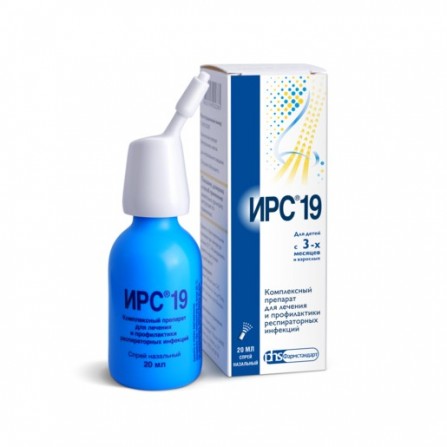More info
Active ingredients
Bacteria lysates
Release form
Spray
Composition
Active ingredient: Bacteria lysates 43.27 ml. Additional substances: Glycine 4, 25 g. Active substance concentration (mg): bacteria lysates * 43, 27 ml
Pharmacological effect
IRS 19 enhances specific and non-specific immunity. When spraying IRS 19, a fine aerosol is formed that covers the nasal mucosa, which leads to the rapid development of a local immune response. Specific protection is due to locally produced antibodies of the class of secretory immunoglobulins type A (IgA), which prevent the fixation and reproduction of infectious agents on the mucous membrane. Nonspecific immunoprotection is manifested in an increase in the phagocytic activity of macrophages and an increase in the content of lysozyme.
Indications
Prevention of chronic diseases of the upper respiratory tract and bronchi. Treatment of acute and chronic diseases of the upper respiratory tract and bronchi, such as rhinitis, sinusitis, laryngitis, pharyngitis, tonsillitis, tracheitis, bronchitis, etc. Restoring local immunity after suffering influenza and other viral infections. Preparation for planned surgical intervention on the upper respiratory tract and in the postoperative period. IRS 19 can be prescribed to both adults and children from 3 months of age.
Contraindications
Hypersensitivity to the drug or its components in history. IRS 19 should not be prescribed to patients with autoimmune diseases.
Precautionary measures
Very important! The device functions correctly only under the following conditions: Put the nozzle on the bottle, properly center it and press it gently, without effort. Now the device is ready for use.
Use during pregnancy and lactation
There is insufficient data on the potential for teratogenic or toxic effects on the fetus during pregnancy, so the use of the drug during pregnancy is not recommended.
Dosage and administration
The drug is used intranasally by aerosol administration of 1 dose (1 dose = 1 short pressing of the spray). in order to prevent adults and children from 3 months, 1 dose of the drug in each nasal passage 2 times a day for 2 weeks (it is recommended to begin a course of treatment 2-3 weeks before the expected rise in incidence); for the treatment of acute and chronic diseases of the upper respiratory tract and bronchi: for children from 3 months to 3 years, one dose of the drug in each nasal passage 2 times a day,after prior release from mucous discharge, until the symptoms of infection disappear. Children over 3 years old and adults on one dose of the drug in each nasal passage 2 to 5 times a day until the symptoms of infection disappear; to restore local immunity in children and adults after suffering influenza and other respiratory viral infections, 1 dose of the drug in each nasal passage 2 times a day for 2 weeks; in preparation for a planned surgical intervention and in the postoperative period, adults and children take 1 dose of the drug in each nasal passage 2 times a day for 2 weeks (it is recommended to begin a course of treatment 1 week before the planned surgery). place such reactions as sneezing and increased nasal discharge. As a rule, they are of short duration. If these reactions will take a heavy course, you should reduce the frequency of administration of the drug or cancel it.
Side effects
The following side effects, both related and unrelated to the action of the drug, can be noted while taking IRC19. Skin reactions: in rare cases, hypersensitivity reactions (urticaria, angioedema) and skin erythema-like and eczema-like reactions are possible. On the part of the upper respiratory tract and respiratory organs: in rare cases - asthma attacks and cough. In rare cases, at the beginning of treatment there may be: fever (≥39 ° C) for no apparent reason, nausea, vomiting, abdominal pain, diarrhea, rhinopharyngitis, sinusitis, laryngitis, bronchitis. Described isolated cases of thrombocytopenic purpura and erythema nodosum. If the above symptoms appear, it is recommended to consult a doctor.
Overdose
Cases of overdose are unknown.
Interaction with other drugs
Cases of negative interactions with other drugs are unknown. In the event of the appearance of clinical symptoms of a bacterial infection, antibiotics may be prescribed against the background of the continued use of IRS 19.
special instructions
At the beginning of treatment, a temperature increase is possible in rare cases (≥ 39 ° C). In this case, treatment should be canceled. However, it is necessary to distinguish such a state from the increase in body temperature, accompanied by malaise, which may be associated with the development of diseases of the upper respiratory tract.In the presence of systemic clinical signs of bacterial infection, consideration should be given to the advisability of administering systemic antibiotics. When prescribing drugs based on bacterial lysates for the purpose of immunostimulation to patients with bronchial asthma, asthma attacks may occur. In this case, it is recommended to stop treatment and not to take drugs of this class in the future.



